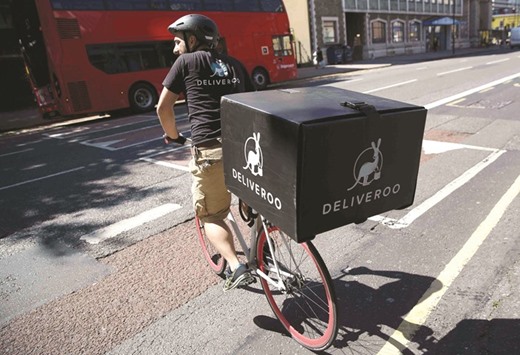Food delivery firm Deliveroo apologised on Monday and said British riders could opt out of its new payment system after it became the latest high-flying tech start-up to face criticism for the employment terms given to its staff.
The London-based company, valued at more than $1bn after a recent funding round, said a proposed plan to pay riders per delivery and not per hour had been a trial that its staff could opt out of if they preferred.
The new system of payment per delivery had prompted staff protests, criticism from the government and condemnation from the opposition Labour party which accused Deliveroo of offering a return to a piecemeal “Victorian system” by cutting costs and increasing insecurity for staff.
“We communicated this to our drivers really badly.
I believe I should apologise for that,” Dan Warne, managing director of UK and Ireland, told Reuters.
“If they don’t like the lack of security that they feel they would have with the per delivery system...
then they can revert to the old system and we’re very comfortable doing that.”
The dispute echoes similar standoffs in the United States and elsewhere between staff and fast-growing tech platforms such as Uber which provide an instant service to customers through workers who are self employed.
With their distinctive black and teal jackets, Deliveroo riders have become a familiar sight on London streets since the firm started trading in 2013, delivering food from restaurants which do not have their own delivery service.
The firm, which competes with the likes of Just East and UberEats, says it has around 6,000 riders in Britain, with 3,000 in London, using either mopeds or, more commonly, bikes.
Active in 12 countries across Europe, Asia and the Middle East, Deliveroo tested a system in five areas in London last week where riders received £3.75 per delivery rather than the current £7 per hour plus one pound per delivery.
Deliveroo said they believed the new system would enable riders to earn more while working fewer hours and said that during the trial the average hourly fees for riders had doubled at the busiest times.
But Deliveroo’s new pay scheme has made headlines in Britain where there is mounting public anger over low pay and job insecurity.
Workers aged 25 or over are entitled to receive the national living wage of 7.20 pounds, but those who are self employed do not.
Two drivers for taxi app Uber have taken the firm to an employment tribunal in Britain, arguing they should get holiday and sick pay.
“Individuals cannot opt out of the rights they are owed, nor can an employer decide not to afford individuals those rights,” said a spokesman for the department of business, energy and industrial strategy when asked about Deliveroo.
The dispute in Britain follows two years of court and regulatory battles in Silicon Valley, the spiritual home of tech startups, over how dozens of on-demand delivery companies pay drivers as contractors rather than as full-time employees.
“I think that we are in an evolving industry, an evolving economy and there’s a changing nature in the way people work,” Warne said.
British employers have turned more cautious about hiring and the price of homes for sale fell by the most since late 2015, according to surveys that added to signs the economy has stumbled since the Brexit referendum.
But shoppers seem to have brushed off the shock of the June vote to leave the European Union, another survey showed, suggesting consumer spending will soften the hit.
Many economists believe Britain is heading for a recession followed by years of slow growth because of uncertainty about its future trading relationship with the EU.
Earlier this month, the Bank of England cut interest rates and took other measures to soften the impact of Brexit, which it believes will push up the unemployment rate sharply.
One of Monday’s surveys showed the proportion of employers expecting to increase staffing over the next three months dropped from 40% before the vote to 36% after it.
The CIPD, a human resources group, and staffing firm Adecco Group UK & Ireland, also said one in five employers expected to reduce investment in training and skills as a result of Brexit, which will push up the cost of imports because of the fall in the value of the pound. Seven per cent planned to invest more.

A Deliveroo rider in London.
